- Home
- Frank Herbert
A Thorn in the Bush Page 2
A Thorn in the Bush Read online
Page 2
The drink reminded her of the blonde girl who had introduced her to it: Gertie something, an unsmiling Nordic female who hadn’t attracted much business. Too intense.
Mrs. Ross sipped her drink.
But that was in another country, and besides the wench is dead, she thought.
A feeling of relaxed satisfaction crept through Mrs. Ross. She took another sip. This time for relaxation was one of the things she had promised herself the day she paid off the girls, withdrawn her savings, and left for the tropics. This and hot sunlight. She began to giggle with an abrupt thought: Sunlight inside and sunlight outside!
In that instant, with the laughter still in her throat, memory struck Mrs. Ross. She put down her drink, all pleasure gone from it.
Gertie, of course, she thought. And seeing that Hoblitt at his work—the way he acts. He’s precisely like the young artist who knifed Gertie … when he found out how she made her living. Even looks like him. Same scowling kind of a face.
She recalled what the young artist had screamed as the mob dragged him into the night to hang him: “But she was deformed! She was deformed! I only cut away some filth! Painted filth! Deformed!”
Mrs. Ross shook her head to drive out the memory of his voice. The damned fool. Melodramatic to the end … and so … empty.
She looked at her rum and vanilla. No use going back to it.
The ritual had been shattered.
Later, she barked at Serena, found fault with the meat at lunch, even snarled at the pair of nuns, mouse-eyed in sexless brown, who came nibbling at her afternoon to collect for church bells.
Word circulated through San Juan: It was one of Mrs. Ross’s “days.”
The next morning, Hoblitt returned to his position beneath the balcony with a partly completed oil painting and portable easel. There was a stubble of golden beard on his cheeks, paint stained his hands, and he was squinting against the brilliance of the early sunlight as though he had arisen without enough sleep. He wedged the canvas onto the easel, bent to work.
Above him Mrs. Ross fumed. She banged her water can, almost wished she dared spill some on the artist. A restless night had left her in no mood to forgive the arouser of old memories.
Hoblitt wore a white shirt open at the neck, white trousers and tennis sneakers. A blond duck-curl of hair at the nape of his neck lifted when he bent his head. He worked with a smooth sureness that surprised Mrs. Ross. The brush dipped and twisted on the pallet, poised over the canvas—then slid through a controlled flurry of color and shape.
Mrs. Ross glanced across the street, admitted to herself: He’s right—morning light is best.
It gave Paulita’s face a translucent look, put gold flecks in her brown eyes. It bronzed the rust spots on the bars of the iron shutters that stood open against the sides of the window alcove. The red bricks framing the window appeared more red in the early sun, as did the bows in Paulita’s hair. And the old plaster of the wall around the window gained a deeper texture from cross lighting.
Paulita was back at the eye-dodging game with the artist this morning. She had interrupted it only long enough to exchange greetings with Mrs. Ross. The girl turned her head as though to look directly at Hoblitt. (She did this almost every time he paused to study the scene.) Then she shifted her attention past him, through him, above him. Never once did she get caught looking directly at him. But she saw him—knew every move he made.
Mrs. Ross finished the watering, put down the brass can with unnecessary noise, peered over the rail. The face on the canvas, seen from this oblique angle, looked to be a clear likeness—not at all the gaudy, sunburst splashes that rioted through Hoblitt’s other work on sale at the Tienda Moderna.
The Paulita of the painting sat at her punto de cruz, apparently more subdued than in real life, but nonetheless vital and dramatic. She appeared just about to turn her head and look straight out of the picture.
He’s caught the eye-dodging game! thought Mrs. Ross.
A sense of grudging admiration filled her. The painting displayed a depth of feeling … and more. With a sense of shock, she realized that this newcomer, this turista, had also seen right through to the basic moodiness these people never quite shook off.
Mrs. Ross lifted her head, studied the real girl in the window. The painting had pulled a veil from the scene. She saw the touch of malice lurking in the fawn eyes, the anger lines at the edges of the passionate mouth, the cruelty in the straight Castilian nose. It made Mrs. Ross think of Old Spain and the señoritas—the lovely virgins—sitting at their windows: waiting, waiting.
Hoblitt put pallet and brushes onto a rack attached to the cross arm of the easel, turned, stared up at Mrs. Ross. His brows stood out whitely against the tan.
“Don’t you have anything else to do besides look over my shoulder?” he asked.
Speechless, Mrs. Ross stiffened with anger.
“Why don’t you go stir your kettle or something?” asked Hoblitt. “It’s very distracting to have someone looking down like that all the time.”
“Well!” exploded Mrs. Ross. She whirled, fled into her house, slammed the French doors. What an insufferable young man! Things she should have said tumbled through her mind. The very idea! Her anger demanded action. She stalked through the house to the back garden, a space enclosed by high adobe walls and filled with a jungle of green leaves, blue, yellow, and flaming blooms. She grabbed a trowel off the potting table. Why … the very idea! She beat a frenzied rhythm with the trowel on the table. What gall! She fought back her fury, turned to the garden, began weeding around the hibiscus.
Shortly before noon, Serena returned from the market. She had been talking to María Carlotta, the Friesmans’ maid, who also cleaned for their tenant, Hoblitt.
Serena was short statured, her tubular body encased in a heavy cotton dress of Carmelite brown that reached below the calf. She had big features, high cheekbones. The large nose, without indentation at the bridge, sloped into a flat forehead and oily black hair. This hair was parted in the middle, swept back in two braids that fell almost to her waist. A profile view of Serena looked like one of the carved stone Aztec figures in the Museo Nacional. She spoke a coarse Spanish full of village-isms. And some ancestor had given her a mobile voice that unconsciously imitated whomever she quoted.
“Such a terrible morning in the market,” she said. “Pareno again has raised the price of oranges! He has no right! He is an evil man. I have seen him spit during a rainstorm! He will come to no good end.”
She moved about the whitewashed kitchen in a determined, mechanical way—unloading her market basket, hanging her shawl on a peg beside the gas stove.
Mrs. Ross, stinking of a patent sunburn lotion (she had worked too long in the garden) watched from the dining room doorway.
The kitchen was a high room (a story and a half) skylighted to the southeast. Serena’s sandals echoed slap-slap-slap in the space. A pot of beans on a back burner emitted sporadic burps. Aromas of chili, coffee, frying tortillas, onions, and beans overrode the bottled gas smell. There was a residue of odors in the room from all the past meals that seemed to enfold every new aroma.
“The water reservoir is very low today,” said Serena. She began stirring something in a bowl. “There was another failure of the generation during the night.” (By generation she meant electrical generation, a chancy service in San Juan.) “Without the generation the pump of the water could not serve.”
Familiar aromas and the glaring, chalky feeling of the kitchen combined with Serena’s chatter to lull Mrs. Ross into a semi-trance. She rocked back and forth on her feet as she listened.
“This Señor Hoblitt,” said Serena, “María Carlotta says that sometimes he tears up a painting before it is finished.” She introduced chopped onion into a reddish-brown sauce simmering on the front of the stove, returned to the metate where she began reducing two tomatoes to pulp.
Mrs. Ross murmured automatically: “How brutal.” She stirred herself to wakefulness, wondered
what would be the fate of Paulita’s portrait.
“Yes!” said Serena. “And, you know, María Carlotta saw him rip pages from a perfectly good magazine once … and burn them! And he cursed the pages while they burned!” She cast a baleful glance at Mrs. Ross. “It makes great danger to curse in front of an open fire.”
“Truly, a man of no sensitivity,” said Mrs. Ross.
“Yes! And when the flowers in his vases wilt, he rages. Such language, God preserve us.” Serena crossed herself with a hand dripping redly of tomato. “And then he must have fresh flowers in his room or the walls tremble from his roaring.” She shook her head, braids swinging. “A real artist, that one.”
Mrs. Ross nodded. Her mind had veered off to the other artist, the one who had killed Gertie. A fearful association began to form in her mind: This Hoblitt is probably just as empty-headed crazy as the other one. What happens when he discovers that Paulita is … deformed … that her beauty doesn’t extend beneath the windowsill?
She shook her head to clear it. These were insane thoughts. But she wondered then if it might not be best to visit Don Jaime, have the source of the irritation removed—perhaps deported.
Serena began loading a tray with food, said: “Someone should warn that man: it makes the most terrible danger to remove dead flowers from a house except after dark.” She lifted the tray. “Comida!”
Mrs. Ross stepped aside for Serena to pass. I’ll visit Paulita this afternoon, she thought. Perhaps she could complain to Don Jaime.
***
Chapter 3
In the courtyard of Paulita Romera’s home a somnolent humming of insects arose from potted flowers around the arcade edge. It was an old house (more than two hundred years) built of adobe and hand-carved beams. A curious interlacing of odors filled the place: mouldy earth, a sharp touch of charcoal smoke, faint acridity from the pigsty and chicken pens out back behind an organ cactus fence—all dominated by the hothouse aromas of flowers.
The old aunt who cared for Paulita, a bent and withered creature in a brown dress of the same cut as Serena’s, admitted Mrs. Ross with a murmured, “Buenas tardes.” Mrs. Ross could hear the pat-pat-pat of someone making tortillas. There was the dry whisking of a broom coming from one of the rooms opening onto the arcade. The aunt clanged the caonzel gate behind them, motioned to where Paulita, wearing a red blouse and with a faded green robe over her legs, sat sewing in the shaded area outside the sala.
An arch of Moorish fretwork framed the girl’s position. The punto de cruz was a red and yellow splash on her lap. Her crutches leaned against a nearby column from which paint was peeling in scabrous patches.
“Good afternoon,” called Paulita. She spoke English because she felt it gratified Mrs. Ross to see how her only student had retained the lessons.
“Good afternoon, Paulita.” Mrs. Ross acquiesced to the choice of tongues, but secretly bridled at the constrictions in English. The thoughts she wanted to convey could be said with more delicate fulsomeness in Spanish.
“It is such a hot day,” said Paulita. “Come into the shade.”
Mrs. Ross crossed the courtyard, thought about the insight to Paulita’s character revealed by the portrait: the cruelty, the iron pride, the malice. A sense of outrage at the artist came over her, as though she had caught a peeping Tom at the window.
The aunt scurried up with a cane chair from the sala, effaced herself with a murmurous, “Dispense me.” She retired to the back of the house, long skirt swishing about her black-clad ankles.
“Do sit down,” said Paulita.
Mrs. Ross resigned herself to the creaking, angular chair, felt it bite into the backs of her legs. Mexican furniture! she thought, sighing.
“It has been hot,” she said. “I’ll be glad when the rains start.”
“The lake is very low this year,” said Paulita. She bit off a thread, glanced sidelong at Mrs. Ross. “You’ve come to talk about the artist. I saw you watching him this morning.”
The girl displayed a decidedly un-Spanish directness when she spoke English, Mrs. Ross thought. She wondered if there might not be an inherent straightness to the language, said: “He strikes me as a very boorish person.”
“I heard what he said to you,” said Paulita. “But I’m sure he means no harm. It is merely …” she shrugged. “… that he is so concerned about his work. Artists, you know.” She glanced down, plucked at a tuft in the robe over her legs.
“Perhaps he doesn’t mean any harm,” said Mrs. Ross. “But I still think he’s boorish. Did he ask you if he could paint your portrait?”
“No. We have not spoken.” Paulita looked up, bent towards Mrs. Ross, dark eyes glistening. “But you have seen the portrait! Is it a good likeness?”
How like a Latin woman! thought Mrs. Ross. “Quite a passable likeness,” she admitted.
“I knew it!” Paulita sat back. “He takes so much time with everything—mixing the paints, testing. She giggled. “Did you see how he dripped paint all over his hands?”
“Don’t you think it’s rude to paint your picture without asking permission?” countered Mrs. Ross.
It was as though Paulita had not heard. “And is he not a handsome young man?” she asked. “So fierce in the eyes!”
“To be sure,” murmured Mrs. Ross. A mosquito whined above her left wrist. She slapped it, recoiled at the stinging in her sunburn. That damnable young man! It was obvious that Paulita would never complain. Mrs. Ross realized that she would have to take the matter up with Don Jaime herself.
But what can I tell him? she wondered.
Paulita drew in a deep breath that filled her red blouse with nubile bust line. “I wish I could see the painting,” she sighed.
A pang touched Mrs. Ross. The girl had so few pleasures, and this painting obviously intrigued her. She still talked of the photographer who had taken her portrait in color for the magazine Revista Nacional.
But the photographer, being Mexican, had asked permission. Mrs. Ross hardened her heart. There’s inherent tragedy in this situation, she told herself. This poor girl is being led to dream foolish things. And here she is … deformed, and without …
Abruptly, Mrs. Ross saw how to present the problem to Don Jaime.
I will see him tomorrow! she thought.
***
Chapter 4
In his parlor, Don Jaime turned away from the copper puddle of sun reflection the lake, brushed the fly from his hair, cleared his throat.
Mrs. Ross stirred out of her reverie, glanced at her jeweled lapel watch. Less than a minute had passed.
“Emma, my dearest friend,” said Don Jaime in his lisping Spanish, “it is that you fear the young man will do harm to Paulita, no?”
“Precisely.”
“But you cannot be certain of this thing.”
“Who would take a chance in such a matter?” demanded Mrs. Ross.
Don Jaime pursed his lips, pinched in his cheeks. He looked more than ever like the figure of the crucifix. “But, of course. However, I would very much like to see this painting.”
Mrs. Ross stiffened. She had learned to be wary of Don Jaime’s digressions when coming to a point.
“A natural desire, no?” asked Don Jaime.
“What do you propose?” asked Mrs. Ross.
“I will use all of the tact of which I am capable,” said Don Jaime. “I will be the soul and heart of discretion. We will be together, the artist and I, with the painting before us. What could be more natural than to lead the conversation around to Paulita’s tragic condition?”
“God preserve us!” blurted Mrs. Ross. “That’s the very thing you mustn’t do!”
“But why not?”
“I told you what the other artist did when he learned of the girl’s deformity!” (Mrs. Ross had altered the story of Gertie slightly, then realized that possibly the girl had been deformed—although not in a physical sense.)
Don Jaime’s brows contracted in a puzzled frown. He thought: It is possible that the youn
g man does not know about Paulita’s legs. But could it make such a difference as that?
“It this a characteristic of all artists from América del Norte?” he asked.
“Only of a certain type,” said Mrs. Ross. “And this one shows all the symptoms of being that type.”
Don Jaime nodded. “To be sure.” And then so low that Mrs. Ross almost missed it: “Gringos!”
“You have come to a decision?” ventured Mrs. Ross.
A sigh convulsed Don Jaime’s thin chest. “As God wills it.” He raised a finger. “But such things take time! It must be done with circumspection.” Then, to let Mrs. Ross know that he was not an utter fool: “… not like the one who had to go to the hospital.”
Mrs. Ross coughed, raised a hand to her mouth to hide a smile. She composed herself, lowered the hand. “I knew I could trust you, Jaime. You have so much experience in matters of the world, such a penetrating mind. You’re the only one who can handle this in a way that will avert tragedy.”
“You are too kind,” murmured Don Jaime. And he thought: Could it be? Is this possible? The young man appears so talented—so simpático.
***
Chapter 5
The next morning, Friday, Mrs. Ross again found Hoblitt bent over his easel in the shade of the balcony when she emerged to water her plants. The brush moved at a furious rate: dip and stroke, dip and stroke. Little rivers of color blended into the portrait. Paulita’s figure appeared almost completed, but the background still showed raw patches of canvas.
Fortified by her angry reveries, Mrs. Ross thought: Just say something to me today, Mr. Smart Alec! I’ll burn your ears off!
But Hoblitt ignored her presence.
Mrs. Ross sniffed. Paint away, fool! You’ll be gone soon.
Paulita executed and advanced ploys in the eye-dodging game, looked up at the balcony. “Good morning, Mrs. Ross.”
“Buenos días, Paulita.”
It stopped there, inhibited by the presence beneath the balcony.
Mrs. Ross smiled, though, paused to admire Paulita. The young woman still worked at the punto de cruz. A great red poinsettia was emerging beneath her needle. She wore green bows in her hair this morning, but Mrs. Ross noted that Hoblitt thus far had ignored the color change. The bows of the painting remained red.

 Direct Descent
Direct Descent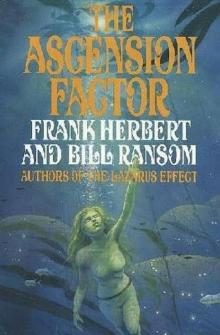 The Ascension Factor
The Ascension Factor The Heaven Makers
The Heaven Makers Children of Dune
Children of Dune Old Rambling House
Old Rambling House Dune
Dune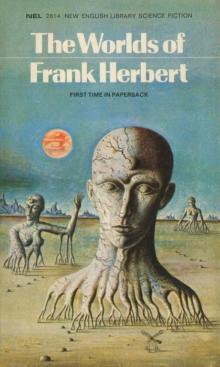 The Worlds of Frank Herbert
The Worlds of Frank Herbert The Jesus Incident
The Jesus Incident Heretics of Dune
Heretics of Dune Whipping Star
Whipping Star Dune Messiah
Dune Messiah Man of Two Worlds
Man of Two Worlds The Book of Frank Herbert
The Book of Frank Herbert Hunters Of Dune
Hunters Of Dune The Tactful Saboteur
The Tactful Saboteur Soul Catcher
Soul Catcher God Emperor of Dune
God Emperor of Dune The White Plague
The White Plague The Green Brain
The Green Brain The Godmakers
The Godmakers Sandworms of Dune
Sandworms of Dune Destination Void
Destination Void The Dosadi Experiment
The Dosadi Experiment Eye
Eye High-Opp
High-Opp The Eyes of Heisenberg
The Eyes of Heisenberg Missing Link
Missing Link Hellstrom's Hive
Hellstrom's Hive Chapterhouse: Dune
Chapterhouse: Dune The Santaroga Barrier
The Santaroga Barrier The Dragon in the Sea
The Dragon in the Sea Operation Haystack
Operation Haystack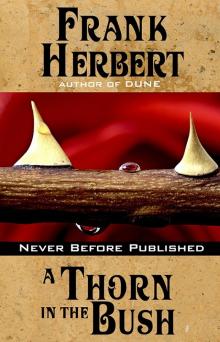 A Thorn in the Bush
A Thorn in the Bush Four Unpublished Novels
Four Unpublished Novels Dune dc-1
Dune dc-1 Jorj X. McKie 1 - Whipping Star
Jorj X. McKie 1 - Whipping Star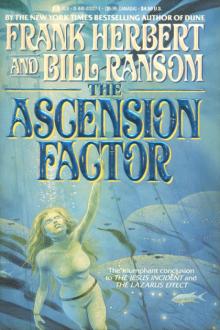 DV 4 - The Ascension Factor
DV 4 - The Ascension Factor Frank Herbert - Dune Book 4 - God Emperor Of Dune
Frank Herbert - Dune Book 4 - God Emperor Of Dune ChapterHouse: Dune dc-6
ChapterHouse: Dune dc-6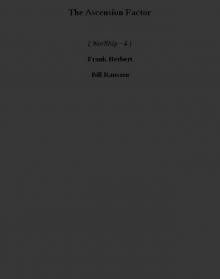 The Ascension Factor w-4
The Ascension Factor w-4 A Game of Authors
A Game of Authors Children of Dune dc-3
Children of Dune dc-3 Destination: Void: Prequel to the Pandora Sequence
Destination: Void: Prequel to the Pandora Sequence The Collected Stories of Frank Herbert
The Collected Stories of Frank Herbert Dune Messiah dc-2
Dune Messiah dc-2 Frank Herbert - Dune Book 5 - Heretics of Dune
Frank Herbert - Dune Book 5 - Heretics of Dune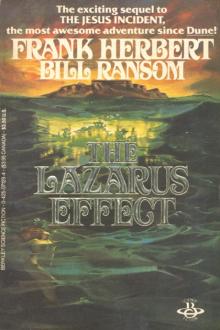 DV 3 - The Lazarus Effect
DV 3 - The Lazarus Effect The Jesus Incident w-2
The Jesus Incident w-2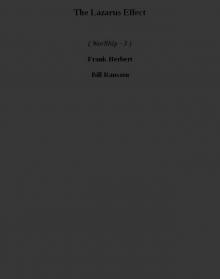 The Lazarus Effect w-3
The Lazarus Effect w-3 Frank Herbert
Frank Herbert The Ascension Factor: Pandora Sequence
The Ascension Factor: Pandora Sequence Dune (40th Anniversary Edition)
Dune (40th Anniversary Edition) The Dosadi Experiment c-2
The Dosadi Experiment c-2 The Lazarus Effect
The Lazarus Effect God Emperor of Dune dc-4
God Emperor of Dune dc-4 The Pandora Sequence: The Jesus Incident, the Lazarus Effect, the Ascension Factor
The Pandora Sequence: The Jesus Incident, the Lazarus Effect, the Ascension Factor The Green Brain (v4.0)
The Green Brain (v4.0) The Heaven Makers (v4.0)
The Heaven Makers (v4.0) Heretics of Dune dc-5
Heretics of Dune dc-5